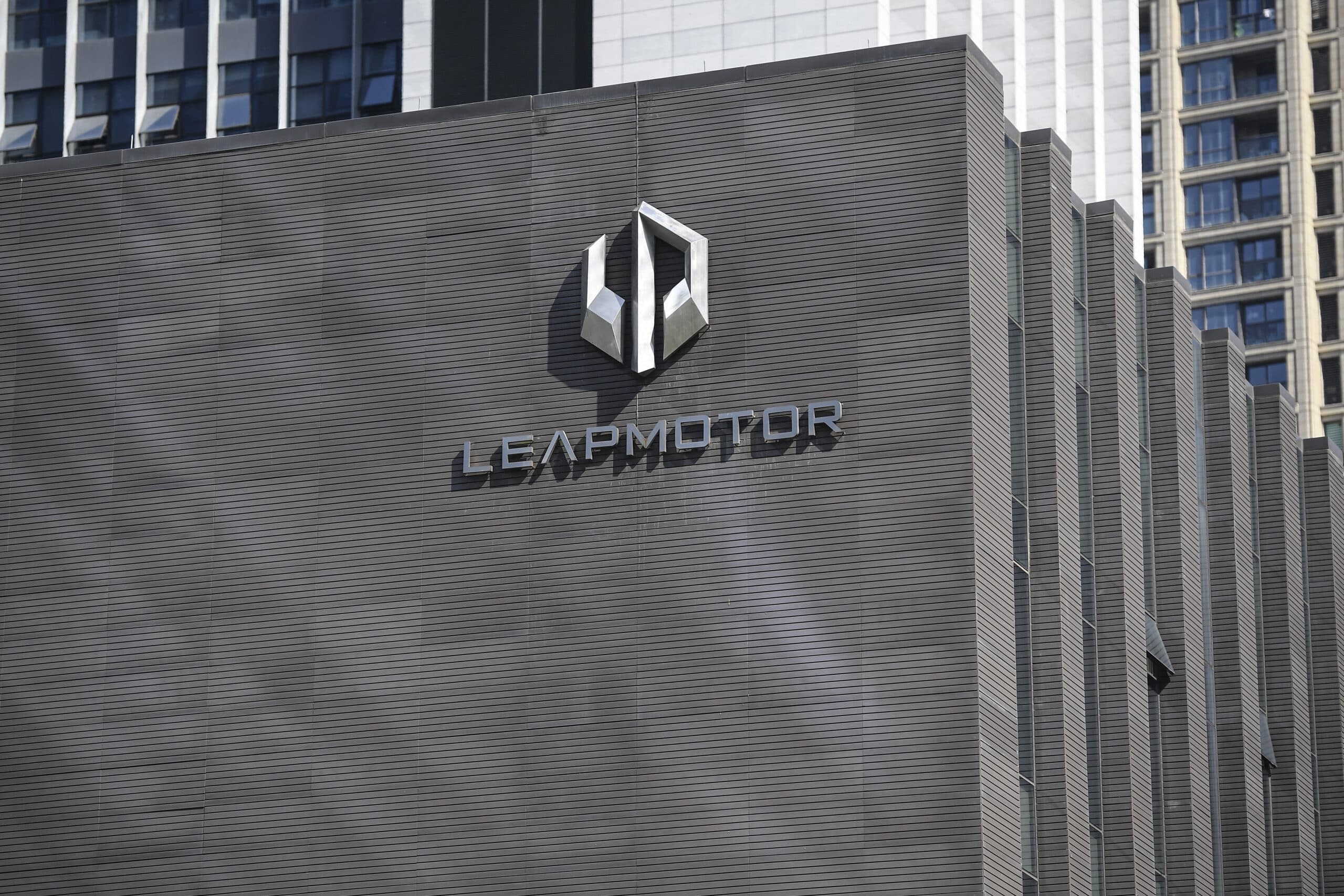
A emblem of Chinese language electrical automobile maker Leapmotor is seen at its headquarter in Hangzhou, in japanese China’s Zhejiang province on Could 14, 2024. A three way partnership by world automotive big Stellantis and Chinese language electrical automobile start-up Leapmotor will begin transport automobiles to Europe in September, executives stated on Could 14. (Picture by AFP) / China OUT
Brussels, Belgium — The European Union on Thursday slapped further provisional duties of as much as 38 p.c on Chinese language electrical automotive imports due to “unfair” state subsidies, regardless of Beijing’s warnings the transfer would unleash a commerce battle.
A European Fee probe launched final yr concluded that state subsidies for Chinese language EV producers had been unfairly undercutting European rivals — which Brussels desires to protect as they make the transition from thermal to electrical energy.
The Chinese language Chamber of Commerce to the EU slammed the tariffs, approaching prime of present import duties of 10 p.c, as “politically-motivated” and “protectionist”, whereas voicing hope the dispute may but be resolved by means of dialogue.
READ: China warns EU tariffs on EVs would ‘hurt’ Europe’s pursuits
Europeans themselves are cut up on the transfer, with Germany and its homegrown auto champions, who do vital commerce with China, fearing it is going to do extra hurt than good if it results in a clampdown on EU exports as Beijing has already threatened.
German auto big Volkswagen slammed the transfer as “detrimental” whereas the top of BMW stated the tariff battle “results in a lifeless finish”.
France and Italy have pushed for tariffs on Chinese language EVs — whose market share within the EU has skyrocketed — however Sweden like Germany has expressed reservations, whereas Hungary is outright opposed.
The provisional tariffs will kick in from Friday, with definitive duties to take impact in November for a interval of 5 years, pending a vote by the EU’s 27 member states.
“Our investigation… concluded that the battery electrical autos produced in China profit from unfair subsidization, which is inflicting a menace of financial damage to the EU’s personal electrical automotive makers,” the EU’s commerce chief Valdis Dombrovskis stated.
READ: China premier calls to ‘oppose decoupling’ at financial discussion board
In response, the fee imposed provisional duties on main Chinese language producers together with 17.4 p.c for market main BYD, 19.9 p.c for Geely and 37.6 p.c for SAIC.
Different producers in China that cooperated with the EU will face a tariff of 20.8 p.c, whereas people who didn’t cooperate could be topic to the utmost 37.6 p.c obligation.
US tech billionaire Elon Musk’s Tesla — which manufactures in China — is the one electrical automaker that has requested Brussels for its personal obligation fee, to be calculated based mostly on proof it has submitted.
‘Intensive’ talks with China
The transfer comes regardless of the opening of talks between Chinese language and EU commerce officers, however Brussels will proceed “to have interaction intensively with China on a mutually acceptable resolution”, commerce chief Dombrovskis stated.
China’s electrical automotive maker Nio stated it nonetheless hoped for a decision with the EU, whereas fellow EV maker XPeng stated it might “discover methods to minimise the affect on customers” with out altering its worldwide technique.
EU officers have indicated that, ought to a negotiated resolution emerge, they might not finally have to levy the tariffs.
READ: Chinese language corporations eye Morocco to money in on US electrical automobile subsidies
However Dombrovskis cautioned that “any negotiated final result to our investigation should clearly and absolutely deal with EU issues and be in respect of WTO guidelines.”
Beijing has already signalled its readiness to retaliate by launching an anti-dumping probe final month into pork imports, threatening Spanish exports, and Chinese language media recommend additional probes may very well be within the works.
Chinese language officers have additionally railed in opposition to EU investigations concentrating on state subsidies within the inexperienced tech sector, together with wind generators and photo voltaic panels.
Anticipated minimize to imports
The USA has already hiked customs duties on Chinese language electrical automobiles to 100%, whereas Canada is contemplating comparable motion.
However Brussels faces a fragile balancing act because it seeks to defend Europe’s auto business — the jewel in its industrial crown — whereas each avoiding a dangerous showdown with China and assembly its targets for slashing carbon emissions.
The EU goals for Europeans to change massively to electrical autos because it plans to outlaw the sale of latest fossil fuel-powered automobiles from 2035.
Chinese language-made EVs’ market share within the EU climbed from round three p.c to greater than 20 p.c prior to now three years, in keeping with the European Car Producers’ Affiliation.
Chinese language manufacturers account for round eight p.c of that share, it stated.
German displeasure
Germany’s Kiel Institute for the World Economic system, alongside Austrian institutes, predicted the provisional greater taxes would cut back automobile imports from China by 42 p.c. They added that electrical automotive costs may rise by a median of 0.3 to 0.9 p.c within the EU.
German auto producers concern any retaliation may harm their actions in China, and Germany’s Vice Chancellor Robert Habeck visited Beijing final month on an eleventh hour mission to avert a dangerous commerce battle.
Duties had been “usually not appropriate for strengthening the competitiveness of the European automotive business in the long run — we reject them”, Volkswagen stated in an announcement. The EU refused to touch upon the criticism.


